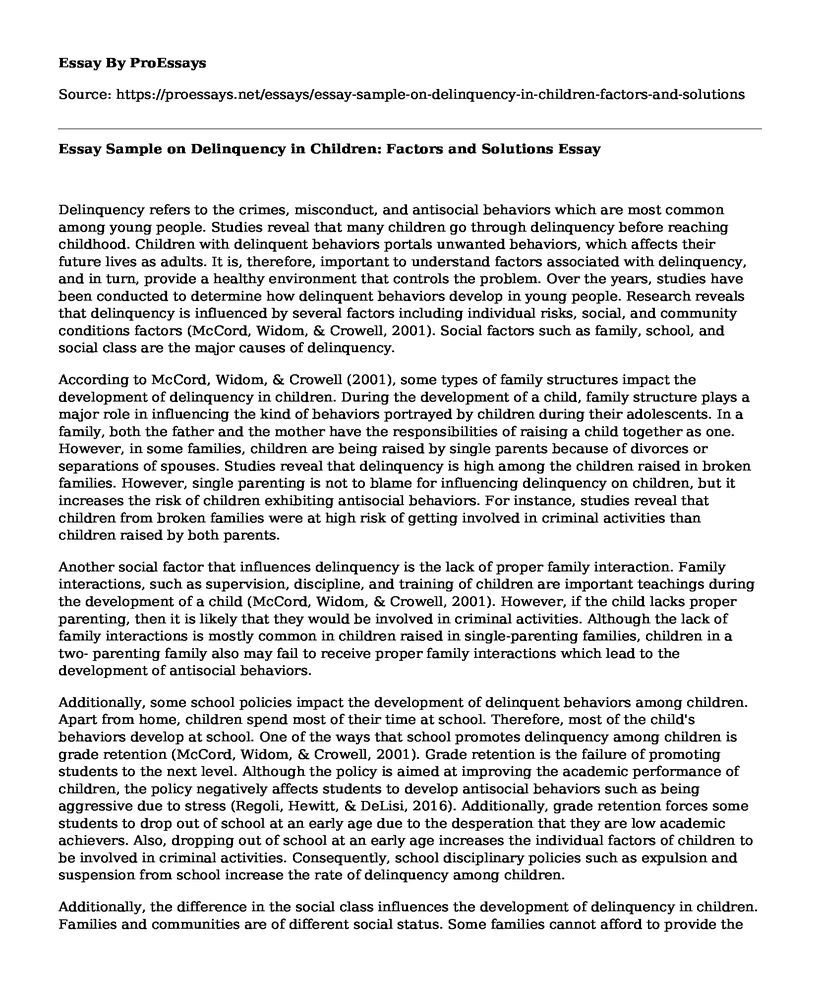Delinquency refers to the crimes, misconduct, and antisocial behaviors which are most common among young people. Studies reveal that many children go through delinquency before reaching childhood. Children with delinquent behaviors portals unwanted behaviors, which affects their future lives as adults. It is, therefore, important to understand factors associated with delinquency, and in turn, provide a healthy environment that controls the problem. Over the years, studies have been conducted to determine how delinquent behaviors develop in young people. Research reveals that delinquency is influenced by several factors including individual risks, social, and community conditions factors (McCord, Widom, & Crowell, 2001). Social factors such as family, school, and social class are the major causes of delinquency.
According to McCord, Widom, & Crowell (2001), some types of family structures impact the development of delinquency in children. During the development of a child, family structure plays a major role in influencing the kind of behaviors portrayed by children during their adolescents. In a family, both the father and the mother have the responsibilities of raising a child together as one. However, in some families, children are being raised by single parents because of divorces or separations of spouses. Studies reveal that delinquency is high among the children raised in broken families. However, single parenting is not to blame for influencing delinquency on children, but it increases the risk of children exhibiting antisocial behaviors. For instance, studies reveal that children from broken families were at high risk of getting involved in criminal activities than children raised by both parents.
Another social factor that influences delinquency is the lack of proper family interaction. Family interactions, such as supervision, discipline, and training of children are important teachings during the development of a child (McCord, Widom, & Crowell, 2001). However, if the child lacks proper parenting, then it is likely that they would be involved in criminal activities. Although the lack of family interactions is mostly common in children raised in single-parenting families, children in a two- parenting family also may fail to receive proper family interactions which lead to the development of antisocial behaviors.
Additionally, some school policies impact the development of delinquent behaviors among children. Apart from home, children spend most of their time at school. Therefore, most of the child's behaviors develop at school. One of the ways that school promotes delinquency among children is grade retention (McCord, Widom, & Crowell, 2001). Grade retention is the failure of promoting students to the next level. Although the policy is aimed at improving the academic performance of children, the policy negatively affects students to develop antisocial behaviors such as being aggressive due to stress (Regoli, Hewitt, & DeLisi, 2016). Additionally, grade retention forces some students to drop out of school at an early age due to the desperation that they are low academic achievers. Also, dropping out of school at an early age increases the individual factors of children to be involved in criminal activities. Consequently, school disciplinary policies such as expulsion and suspension from school increase the rate of delinquency among children.
Additionally, the difference in the social class influences the development of delinquency in children. Families and communities are of different social status. Some families cannot afford to provide the basic needs of a child, and thus influencing children to be involved in illegal activities (McCord, Widom, & Crowell, 2001). Studies reveal that children that are raised in families and communities with low social status are likely to be involved in criminal activities. For instance, some children develop the behavior of stealing at an early age because they cannot acquire basic needs. Additionally, poverty, joblessness, and homelessness increase the rate at which children are involved in bad behaviors.
Conclusion
To conclude, social factors such as family structure, low social class, and school policies increases the rate of delinquency in children. Children tend to develop bad behaviors as they interact with their parents, school programs, and the community surrounding them. Therefore, it is recommended that proper parenting is emphasized to encourage good behaviors in children.
References
McCord, J., Widom, C. S., & Crowell, N. A. (2001). Juvenile Crime, Juvenile Justice. Panel on Juvenile Crime: Prevention, Treatment, and Control. National Academy Press, 2101 Constitution Avenue, NW, Washington, DC, 20418.
Regoli, R. M., Hewitt, J. D., & DeLisi, M. (2016). Delinquency in society. Jones & Bartlett Learning.
Cite this page
Essay Sample on Delinquency in Children: Factors and Solutions. (2023, Feb 09). Retrieved from https://proessays.net/essays/essay-sample-on-delinquency-in-children-factors-and-solutions
If you are the original author of this essay and no longer wish to have it published on the ProEssays website, please click below to request its removal:
- Policing Strategies in Hot Spot Regions - Literature Review Example
- Early Biological Perspectives on Criminal Behavior Essay
- Argumentative Essay on Negative Effects for the Legalization of Marijuana
- Criminology Strain Theory in 2pac's Lyrics Essay
- Investigation of Crime Essay Example
- Research Paper on Legal Issues Surrounding Marriage and Drug Courts
- Essay Example on Modern Strategies for Curbing Long-Lasting Disturbance Gangs







